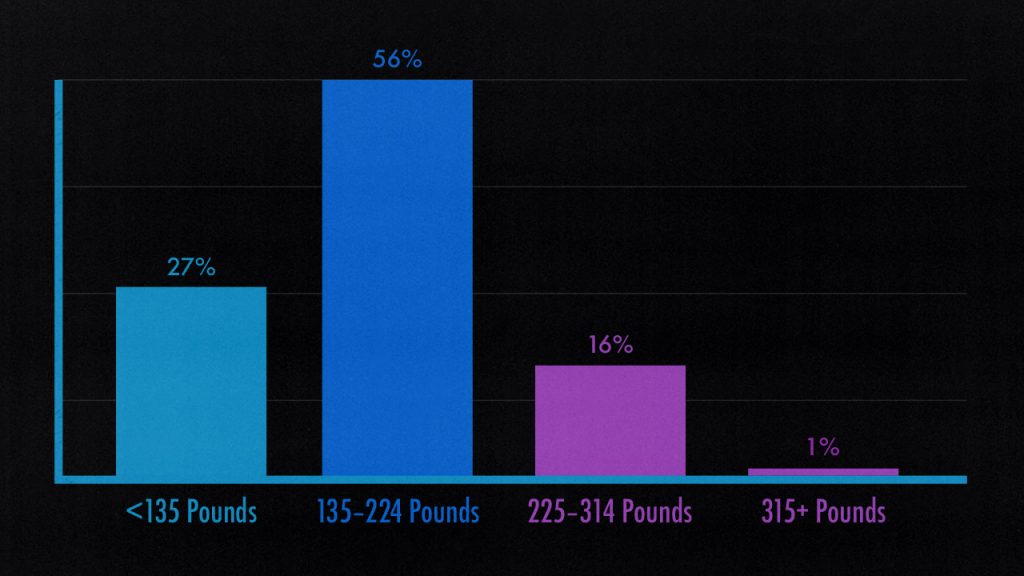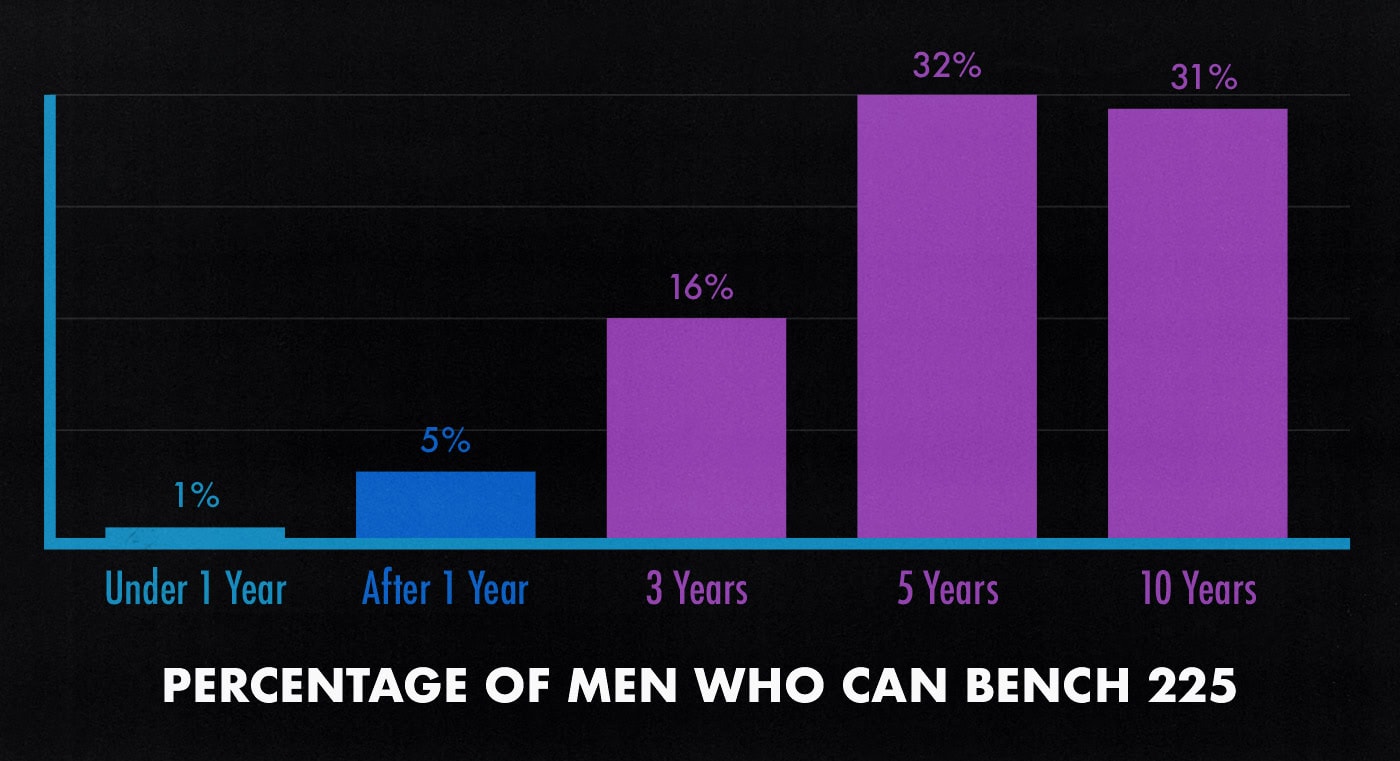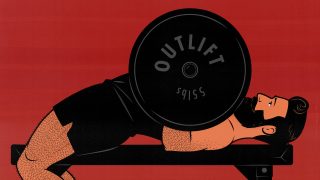
Is 225 a Good Bench Press? What Percentage of Men Can Do It?
A few years ago, Greg Nuckols asked his Stronger by Science readers how long they’d been strength training and how much weight they could bench press. He found that the average powerlifter could bench 185 pounds within his first three months and 225 pounds within his first year (article).
But the sport of powerlifting tends to attract unusually strong guys. Many of those guys have athletic backgrounds. And the ones most likely to stick with powerlifting are the ones who see early success with it. Plus, many aren’t natural.
I’ve noticed that most lifters I talk to haven’t ever benched 225 pounds, and I almost never see guys loading two plates on the bar at the gym.
So, I surveyed 585 of our newsletter subscribers. I also asked the Stronger by Science community how often they see other guys benching 225 pounds.
What Percentage of Men Can Bench 225?
A two-plate bench is relatively uncommon. Only 17% of men who completed my survey had ever benched 225 pounds, and only 1% had reached the next milestone of 315 pounds.
I can be a little more specific. Here are the stats broken down by how long guys have been lifting weights:

1 in 100 guys can bench 225 within their first year of lifting weights. 1 in 20 can do it after a year, 1 in 6 after 3 years, and a third of guys can do it after 5 years. That’s where most guys plateau forever.
The highest strength standards I’ve seen were from Stronger by Science, so I asked around the Stronger by Science community. Many guys responded that they still hadn’t benched two plates. Almost all of them said a 225 bench was rare to see at commercial gyms, but some pointed out that it was common at powerlifting gyms.
Dr. Milo Wolf (who works for Stronger by Science) pointed out that a 225 bench press gets even more impressive when you consider that the people most likely to persist with weight training are the ones who respond best to it.
StrengthLevel estimates the average lifter could bench press 217 pounds for a single repetition. That isn’t so far from benching 225 for 1 rep, but most guys aren’t throwing up singles. Most of the guys we see at commercial gyms are doing sets of 5–15 reps.
86% of the guys who could bench 225 pounds believed they were stronger than the average man. They’re correct. Not just that, they’re also stronger than two-thirds of guys who’ve been lifting for over a decade.
Caveats
I also run Bony to Beastly, a site for naturally thin guys. Most of the guys who completed the survey come from there, and they tend to be thinner than the average guy. Being thinner than average means we’re starting behind the starting line. It’s common to start off benching 65 pounds, not 185 pounds.
On the other hand, the average overweight man might be more interested in losing fat. That focus on losing weight might hold up their strength gains. It’s much easier to gain strength while eating a bulking diet.
Being thin has its advantages, too. 57% of our readers can do over 30 push-ups. Most stockier lifters would struggle to match that, even if they’re benching 225 for reps.
Conclusion
Benching 225 pounds isn’t an amazing bench press. It won’t cause other lifters to gasp in shock. But it’s definitely a good bench press, and maybe even a great one. Most men can’t do it, even after trying for over a decade. It’s more than enough to earn you the respect of lifetime lifters.
If you’re a powerlifter, you’ll need to bench closer to 315 pounds to earn that same amount of respect. In our survey, only 1 in 100 guys could bench press three plates. I had to gain seventy pounds to do it, bulking up from 130 to 200 pounds. It took me a little over ten years.
If you’re an NFL player, you’ll need to bench 225 for upwards of a dozen reps. I found that much easier than benching 315 for a single repetition, especially since the technique standards are much looser than with powerlifting.
Alright, that’s it for now. If you liked this article, you might like our articles on how much you should be able to squat, bench press, deadlift, and overhead press.
Shane Duquette is the co-founder of Outlift, Bony to Beastly, and Bony to Bombshell. He's a certified conditioning coach with a degree in design from York University in Toronto, Canada. He's personally gained 70 pounds and has over a decade of experience helping over 10,000 skinny people bulk up.






Hello,
i just wanted to populate this comment section given that this article is well written and in need of some appreciation.
i used to think i was a hard gainer, but honestly my diet and regime were none existent. Now i’m older, i know i gain quite easily. Looking back, my chest has always been strong, even without much training it wasn’t that long before i could one rep 300lbs, though i presume years of strict pressing and bulking up to 100kg had a large part to play in that. If anything, it seems like my lower body isn’t as receptive to training.
It’s nice to have a respectable accomplishment in something i’m passionate about. Thank you for the research!
Thank you, David!
Congratulations on benching 300 pounds! That’s a great feat of strength!
Where the heck are all these gyms full of people that can’t/don’t ever put 2 plates on the bar? Even back in the small gym I used to go to starting in 7th grade there were plenty of guys doing three plates, including my freshman teacher who I’d see there sometimes if we went right after school.
Now I’m by no means “bragging” by saying this. I am not a super strong guy at all, but I first benched 225 about a month before freshman year of high school. Granted, like I said my best friend and I starting lifting pretty seriously in 7th grade(or maybe I should say “pretty seriously for 7th graders”), going for 2-3 hours a day literally everyday, until sophomore year of high school(when we starting smoking weed before going to the gym, which soon turned into smoking INSTEAD of going to the gym, which(for me) turned into a serious pain killer addiction, which turned into me having to shoot up in the school bathrooms junior year between the end of school and the start of football or baseball practice, which I of course stopped playing soon after.)
So…yeah. don’t do drugs. Sorry, I’m not sure why I brought that up. lol.
also, I’m only responding to your comment because I’m new here and it wouldn’t let me post a comment on my own, only replies. or maybe I just couldnt figure it out.
thanks for the info though. very interesting.
Thanks for the comment, man!
I’m sorry to hear about what happened. I hope you’ve managed to find your way back.
If you go to the bottom of the comment section, it should let you post a comment. No worries, though. Responding to my comment is perfectly fine. I see them all either way.
I think starting lifting in 7th grade and spending 2-3 hours per day lifting is pretty serious. Benching 2 plates after 2–3 years of that totally makes sense. I don’t think that’s representative of the norm, though. Most guys don’t do that.
I think with good training and enough food, most guys could bench 3 plates. 2 plates is much, much easier. I’m not at all trying to cast doubt on our potential. However, most people never get there.
Nice write up and some very interesting facts.
I was a runner in my youth and didn’t start lifting regularly until 37. I’m 6’3″ with long arms and always really struggled with the bench press. After my first 3-4 months of steady training, I finally got to where I could do sets at 135. I had a partner I worked out with who was much smaller but much stronger on the bench. We worked out consistently for a year before I left the area for a project. By the end of that year, my max was 185-195 if I recall. I wasn’t able to keep up my routine for the year away but didn’t lose much either.
I returned to my old routine with my buddy and while continuing to improve still couldn’t master the elusive 225. That all changed at a doctors appt where the Dr asked me if I could bench 155 pounds 100 times. I looked at him like he was crazy, but he said he could. 10 sets of 10 with normal breaks. My next trip to the gym, I attempted this with 135 and was successful. Doing it only once a month, it took me 4 months to get 145. I never got 155.
My point is that during this time, another guy at the gym saw me and asked about my max. When I told him 215, he said there was no way he could do my workout, and his max was 235. We agreed to attempt the following week. Crazy as it may sound, I got 225 pounds 5 times that day.
We periodically would check in and my max ended up being 285 at 39 years of age. I’m 65 now and can still get 225 3–4 times but have to be a lot more careful with my joints. I still do the 10 sets of 10 at 135 once a month.
I personally believe that 225 is a great lifting goal for anyone to strive for. I know it was part of the reason for my consistency at the gym, and exercise is a big reason I have avoided many health issues. Use it or lose it is a real thing, and I hope people will take my words as a reason to push through on the days you don’t feel like it and get in the workouts.
Again thanks for your article.
Thank you, Dave!
That’s awesome. At 65, you’re still benching quite a bit more than most lifetime lifters at any age.
285 is a fantastic 1-rep max! Nice job.